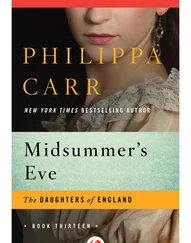“What is love? ’tis not hereafter;
Present mirth hath present laughter;
What’s to come is still unsure:
In delay there lies no plenty;
Then come and kiss me, sweet and twenty,
Youth’s a stuff will not endure.”
She had a lute, and as she sang she played it so sweetly, and I thought I had never seen anyone as lovely as Harriet was with her black hair falling over her shoulders and her eyes a luminous blue in that pale strange face.
“There should be more singing on stage,” said Madame Lamotte, caressing Fenn’s soft blond hair. “The audience likes it.”
“You have a beautiful voice,” I said, looking straight at Harriet.
She lifted her shoulders. “It passes,” she replied.
“What wonderful lives you all must have!” I cried. They laughed and I could not quite understand the glances which passed between them. I knew later they were a little cynical.
Monsieur Lamotte said: “Aye, it is a grand life … I’d take no other. Hard at times. And for the English players now … life is a tragedy. What a barbarian this man Cromwell is! There is no longer a theatre in England I understand. God help your poor country, little lady.”
“When the King comes back there will be theatres again,” I said.
“People will not want the old Globe and the Cockpit,” said Harriet. “They will want new playhouses. I wonder if I shall ever see them.”
Then the talk became general. More wine was drunk and the candles guttered, and although I did not want the evening to end, my eyelids were pressing down over my eyes as though they refused to stay open any longer. The children were all asleep and Lucas was finding it hard to keep awake.
I told Jeanne that the children should be taken to their beds and they were carried off, Mrs. Lamotte insisting on carrying Fenn.
This broke up the party, and it was Madame Lamotte, back in the hall after kissing Fenn and all the children fondly, a fact of which they were too sleepy to be aware, who announced that they should get some sleep as they had a heavy day’s travel ahead of them.
The servants and I took them to the rooms we had assigned to them—the three women were in one and the men in another. I apologized for the scantiness of the accommodation at which Monsieur Lamotte declared “It is princely, dear lady. Princely.”
Then I went to my room, undressed and tried to sleep, which was quite impossible after all the excitement.
I felt depressed because tomorrow they would be gone. The château would settle down to its normal routine which I now knew was intolerably dull. I should never again be able to delight in its simple pleasure as I had before. I wanted to be an actress like Harriet Main. She had stood out among them all.
How magnificently she had played and how I should have loved to see her act the part in English. What we had seen had been a French translation much abridged … and losing a great deal in the translation as must be expected. Monsieur Lamotte had said that it was one of the most popular of Shakespeare’s plays and that was why it had been translated into French. Perhaps they should have done a French play, but they had played Shakespeare as a compliment to us.
How gracious I thought them! How charming! Of course they were acting all the time, but how pleasant that was!
I went into a reverie then. I imagined that King Charles was restored to his throne, that he opened theatres all over the country and that our parents came to take us back to England. We were at Court and there was a play for the King’s entertainment in which I was chosen for the principal role.
It followed on naturally from that wonderful evening.
Then I heard voices. I sat up in bed. They were in the corridor … low hissing voices.
I put a wrap about me and, going to the door, opened it slightly.
Two women were standing in the corridor. One of them was Harriet Main, the other Fleurette.
“I’m sick and tired of your jealousy,” Harriet was saying.
“Jealousy! I wouldn’t be in your shoes. Today’s favourite is tomorrow’s outcast.”
“You should know,” retorted Harriet, “having lingered long in the second part.”
Fleurette brought up her hand and slapped Harriet’s face sharply. I heard the contact distinctly.
“Don’t dare lay hands on me,” said Harriet, returning the slap.
“You English slut,” was the answer, and to my horror she lifted her hand again. I saw Harriet catch her wrist and shake her. Then Fleurette suddenly wrenched herself free and Harriet stepped backwards. Behind her were three stairs. It was a good thing it was not the main staircase. She toppled and fell.
“That’ll teach you,” hissed Fleurette. “That’s what you needed. A fall … before Jabot drops you. It’ll prepare you for what’s to come.”
I was half out of the door, ready to go and see if Harriet was hurt, then I realized that I should only cause embarrassment if they knew I had been eavesdropping, so I hung back. I saw Harriet get to her feet and come tottering back up the three stairs.
“Go on,” jeered Fleurette. “You’re not hurt. You could have a wall fall on you and you’d come bobbing up. I know your kind.”
“Then,” said Harriet, “you should be careful not to anger me.”
Fleurette laughed and went into the room I had prepared for them. A few seconds later Harriet followed.
It was clear that they disliked each other and I fancied the handsome Jabot was the reason. Life might be exciting in the playacting world but it was clearly far from serene.
I was awake early next morning. It had been long before I slept and then only fitfully, and the first thing I thought when I awakened was we must feed the players well before they went out into the cold.
I went to the window. It was no longer snowing and there was only a faint white layer on the ground. I had hoped that they might be snowbound and have to stay with us because the weather was too bad for them to travel. I pictured our having plays every night.
I went to the kitchens. Jacques was already there with Jeanne and Marianne. They were bustling about preparing ale and bread with cold bacon, as determined as I that the actors should be fed well before their departure.
The château had taken on a new vitality since they had arrived. Now their voices could be heard—such loud resonant voices; they could not say a good morning without making it sound full of drama, and we were all a little depressed because their stay was coming to its end.
Jeanne set the table in the hall while Marianne hastily stirred up the fire, which had not completely died down during the night.
Monsieur Lamotte descended and came at once to me. He kissed my hand and bowed. “Dear lady, rarely have I spent such a comfortable night.”
“I trust you were warm enough.”
“The warmth of your welcome wrapped itself around me.” he replied, which might have been another way of saying that the bedclothing had not been very adequate, which I could well believe.
Madame Lamotte came down with the three children to whom she was telling the story of one of the plays in the company’s repertoire.
She greeted me effusively and declared that all her life she and the entire troupe would remember with pleasure their visit to Château Congrève.
Their eyes widened with delight when they saw the food, and Monsieur Lamotte declared that they would partake of it at once.
“We are ready, loins girded, like the children of Israel. Alas, there is a sadness in our hearts. I know that you would extend your hospitality to us for another night … and I will tell you this, dear lady, part of me hoped to see a blizzard blowing that we might be forced to fall once more upon your kindness. Inclination, dear lady. But there is duty. If we do not reach Paris on time, what of those who are waiting to see our play? They are expecting us. We are booked, lady, and every true actor would rather disappoint himself than his public.”
Читать дальше












